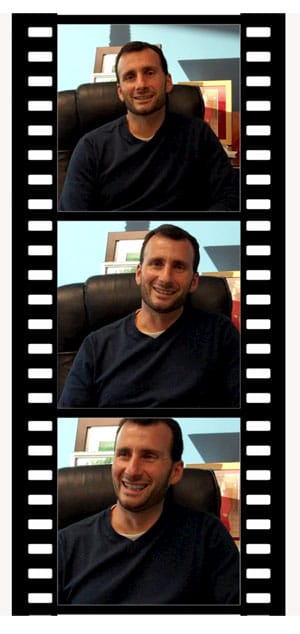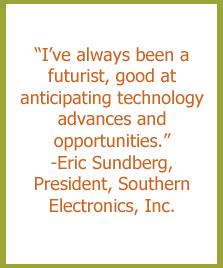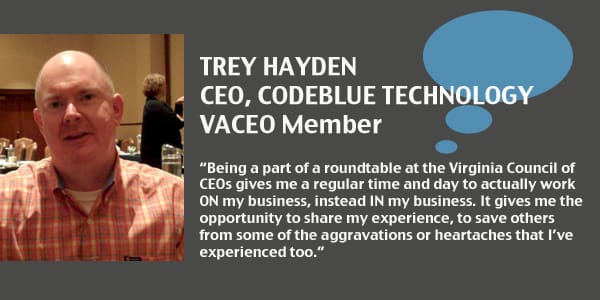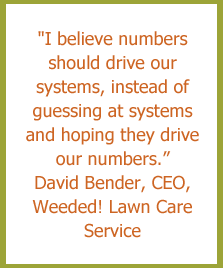VACEOs Member Profile: Randy Sklar of Sklar Technology
“It happened kind of naturally,” says Randy Sklar, when asked if there was one pivotal moment when his father handed him the reins to the family business. “I remember it was around 2001, when the economy started to go sour and our business was really suffering. He began to look toward me for guidance. I suggested we move away from retail where the return was just too low. I began to focus on our commercial accounts and developed a new program for them that eventually brought us the cash we needed at the time. We even turned a profit that year. That was the turning point.”
Randy later got some words of wisdom from two family business owners in his Roundtable: transitioning from second-in-command to primary business owner will have its bumps. It takes courage and faith, they said, and they were ready to help guide him through the exit strategy.
Today, Sklar Technology is a multi-million dollar company in the middle of a remodel. Randy plans to add more employees to his team of 13, and the preventive maintenance program he brought to the once ailing technology company is still an important part of his business, along with a program that thwarts malware which can cripple a business in minutes.

Computer Corner to Sklar Technology
Sklar Technology began under a different name. In 1982 the business was called the Computer Corner, which back then more aptly described the retail-focused computer shop. As the commercial accounts and range of services grew, a name change was required in 2007 — to the chagrin of Randy’s father. But this was yet another necessary step to capture more accounts. It was also another example of son Sklar’s growing decision making power.
The company has shaken its retail services and has evolved to offer technology management and consulting, network administration and general IT support services to large and small commercial accounts located primarily in the Richmond region.
Randy explains his services in more detail: “Most small companies don’t have internal IT department to overlook their network and give support to the system users. We’re here to be an outsourced, virtual IT person. We handle all the normal services a company requires, like security, end user support, 24/7 monitoring and automated backup/rapid recovery services.”
He adds, “We see our customer’s data as an important asset, but unfortunately business leaders are typically delegating one of the most important areas of the business to the wrong person, persons who don’t have the skill or don’t understand the importance of a security breach, for example. Our customers are those who really depend on and value their data.”
When Ransomware Attacks…
Ransomware is a class of malware that restricts access to an infected computer system. To “get your computer back” you must pay the malware creator a ransom — which typically means coughing up several hundred dollars worth of bit coins.
Sound like a movie script? It’s not. It’s real and small to mid-size businesses are an easy target, says Randy. “People think that these culprits ‘break into’ your system. That’s not true. Businesses are tricked into installing the malicious software. It can be very disruptive. We’re helping a number of local businesses deal with this problem on a regular basis.”
The malware can lock up systems or erase data. For small businesses, it could mean appointments disappear, customer’s accounts are erased, or accounting systems are corrupted.
“Our unique approach is in our proprietary programs and processes. We start with a Risk Assessment to determine what assets are critical to the business and where relevant vulnerabilities exist, then we mitigate these threats and finally we implement our programs and services to keep the data secure and highly available for the end users. The key isn’t to stop this process, security is a discipline. Education and understanding is critical from a leadership standpoint, this is a business issue not an IT issue,” explains Randy.
Clearly the family business has evolved over the last three decades. When you speak with Randy in his office, you can’t help but see pictures of his young family scattered on his desk and on each shelf. We have to ask, “Will the children take over the business?” “There’s no pressure to do that,” Randy is quick to say, but then adds with a smile, “But, they DO already have business cards.”
Seems likely that Sklar Technology, no matter who is at the helm, will always be a family business.
Virginia Council of CEOs Member Profile: Trey Hayden
Mission: CodeBlue
“It’s easy to get swayed or clouded and have your focus interrupted by things that come about when you have a business with employees, or an economy that’s not stellar at the moment — there can be a lot of distractions,” says CodeBlue Technology CEO, Trey Hayden.
He continues, “but if you keep focused on your original mission, then that tends to keep you on the path you need to stay on to be successful.”
Hayden’s focus over the last 23 years has brought him to a large, distinguished, colonial-style office space off of Monument Avenue. A location, Hayden says, central enough to adequately serve his 300 + customers. It also has brought him several honors and awards. (Most recently in 2012, CodeBlueTechnology (CBT) ranked #3 on the SMB 500 list as one of the fastest growing SMB focused IT providers in the USA, and this year, CRN Magazine will be present its Next-Gen 250 award to CBT.)
CBT could be described as a service-based company with a focus on technology. Its mission isn’t to work with the largest, but to serve the smallest. That vision drives CBT’s business philosophy, its management structure, and its hiring and training processes.
Becoming CodeBlue Technology…
Hayden grew up around family members who were farmers, contractors, painters… professionals who worked with their hands. Doers. He couldn’t ignore his genetic tendency to do the same, nor his desire to learn about business. He studied at VCU and, while there, found the ultimate path he would follow while working a part time job at a local computer company.
“I was doing clerical and gopher work for them, but there were guys building PCs in the back. That’s when my mechanical drive took over and I wanted to be a part of it.”
He continues, “I would get my work done as fast as I could so I could sit on a stool and observe as much as I could and talk to the guys and asked them questions when I felt they had enough patience to answer my questions.”
While learning about hardware and PC maintenance from the boys in the back, he was also learning about shipping and receiving, parts management, and eventually, consulting. He became the general manager of the company before he graduated from VCU in 1995.
Fast forward to 1999, he found an opportunity to greatly expand his technical knowledge through another employer. It was while working for this company that he would meet individuals who would eventually provide him with the opportunity to start CodeBlue Technology in January 2003.
Today, CodeBlue offers a slew of communication and IT technology services, including consulting, implementation, training, and maintenance.
Shop Setup to Keep the Cash Registers Ringing
Hayden explains, “CodeBlue’s niche is the small to mid-size company, those with 1 to 1000 employees, and we’ve been that way since the beginning, for 10 years now. Working with the small to medium-size business owner fits with my personality. We get opportunities to work with larger companies, but we don’t always pursue those, as they don’t fit as well with our culture.”
Hayden continues, “Our setup, processes, and systems are all geared for small to mid-size businesses. Sales conversations start with me or one other person, so out of 11 people there are only two focused in business development. Most of our competitors are more sales driven. With us, service comes first; we sell Dell, HP equipment, all the top line of gear, but where we shine is our commitment to making sure those things do what the business needs them to do. We make sure the equipment or network stays dependable, to keep the cash register ringing,” he adds.
Because his service team makes for the bulk of his employees, hiring the right service technician is key. Hayden only hires candidates with very specific qualities.
He explains, “We specifically look for that knowledgable person with great communication skills. A person can be brilliant at what they do electronically, but doesn’t enjoy interacting with customers. We need the person who enjoys the interaction, and who can break down problems or solutions simply. Someone who is able to use analogies and other types of communication skills to help that business owner understand the issue or recommendation. That positive interaction is key to what we are about.”
VACEOS Member Eric Sundberg, President Southern Electronics: Leader, Futurist.
(Trouble seeing video? Please refresh screen.)
Eric Sundberg is a self-proclaimed futurist with an astute “fix it gene” and a fondness for travel. He is tall, thin, and is as equally intense about his work as he is about his love for his giant german shepherd, King, who lounges causally in his office. His business is conducted primarily with others outside of the state, yet he is committed to the development of the Richmond area’s youth.
As a member of the VACEOS, he often shares his experience during confidential roundtable discussions with his peers. Today, we find out about his business vision, how he gives back to the community, and what one piece of advice he has for young entrepreneurs.
About Virginia CEO, Eric Sundberg
Eric proved at an early age to be a hard worker and a leader, not a follower. By 14 he was recruiting kids for his newspaper route and acting as the crew chief for a local swimming pool installation company.
He worked his way through college at a Richmond audio repair shop. By 25 he was ready to be the boss. In that year,1989, he started his own car radio repair business — Southern Autotronics. His company quickly morphed into a $9M, 8-store chain servicing warranties for General Motors, Ford and Chrysler until 2001.
Eric says, “I always had the fix it gene. I took things apart like most kids, but I could put things back together. As I matured I was drawn to the complexity and volume of the auto radio repair work.”
 When the warranty work for the major auto manufacturers moved to Mexico, Eric shifted focus and saw a future in GPS systems. About his second business venture, Navtronix, he says, “I’ve always been a futurist, good at anticipating technology advances and opportunities. I am often though, 10 years ahead of my time. Like with navigation. I had to wait for market acceptance of the products, and the price dropped out — not so much with repair which has always been strong.”
When the warranty work for the major auto manufacturers moved to Mexico, Eric shifted focus and saw a future in GPS systems. About his second business venture, Navtronix, he says, “I’ve always been a futurist, good at anticipating technology advances and opportunities. I am often though, 10 years ahead of my time. Like with navigation. I had to wait for market acceptance of the products, and the price dropped out — not so much with repair which has always been strong.”
Eric went back to his repair roots and started another company, Southern Electronics, Inc. Southern Auto Electronics focuses on dashboard and radio repairs. Its commercial clients include various government and school systems, garages and car dealerships around the world. He also has a solid base of end users who rely on his services.
He reports 80% of his business comes from the web; no doubt a testament to his foresight to start a domain business, and while he was at it, secure names like CarRadio.com, SpeedometerRemoval.com and InstrumentClusterRepair.com for himself.
Live and Die by the Web… and UPS
Eric reports, “One of the secrets to my success is that I found a high-priced, high-value electronics products with a long life for repair. My lifeblood is the web and UPS.”
He has a total of six websites that drive business to his doorstep, and while the complexity of a car’s electronic system has increased, it has also has become self-contained and modular.
Eric explains, “Over the years I often worried that the car radio would one day be a throw away item and the factory would try to replace it. Luckily I was wrong. One reason was the fact that the complexity of the radio has increased over time. What started as simply AM, became an AM/FM, then an 8-track, then a radio cassette, CD and now, a navigation system. The complexity of the content of the radio system has gone up. It justifies the expense of repairing it.”
These days, the car’s radio and navigation system is specifically fitted inside the center console and it’s modular, making it very shippable. As such, Eric’s business has evolved to complete dashboard and instrument cluster repair. He explains, “I also started repairing instrument clusters and speedometers because they are essential components to keep the car or truck on the road. They must be in working order.”
His work is not based on factory manuals or warranty guides, but on his will to fix it and his research skills. He says, “Everything we do here is reverse engineering. My job here is to locate repair parts or techniques to repair components that are failing in high value and/or high volume cars. Like for example, figuring out where to find parts for an unreadable displays on a Mercedes or Audi.” (Answer: Japan.)
Eric points out that his business is based on trust, and even without his strong web presence and business model, it’s his companies hands-on approach to customer service and his 100% satisfaction motto that are the real foundation of his success.
Giving Back
Eric Sundberg has a multi-million dollar electronics business, a thriving domain name business, six websites to manage and a strong desire to travel around the world. To keep up, he’s an early riser and a reader. (Up at 4am; over 30 science and technology publications.)
In his spare time he mentors young adults who show an interest in electronics as well as those who compete in the FIRST® Robotics Competitions. Of the national competition, he says, “Robots are a vehicle to teach kids about teamwork and how to work, experiment, use hand tools and solve problems and interact with adults — the type of skills they will need when they enter into the workforce.”
His next venture is not business-related, but focused toward the community. By this time next year he hopes to pilot an elementary school, after hours science discovery program for underprivileged, gifted students.
One Piece of Advice for Entrepreneurs
Eric has been involved in repairing automobile electronics for over 44 years. When asked what one piece of advice he would offer a startup, he doesn’t hesitate. “Locate a problem that needs solved. Find a niche business that others can’t do easily… [something] that is going to be ongoing and sustainable.”
Eric Sundberg has been an active member of the Virginia Council of CEOs since 2007. He is one of over 160 members who welcome the opportunity to share their business knowledge and concerns each month during member roundtable discussions. To learn more, visit the Virginia Council of CEOS YouTube page or VACEOS website today.
VACEOS Member David Bender: Inside the Passion (Part II)
In our first David Bender, Inside the Passion article, we learned that David’s drive for success came at a very early age. Today the Weeded! Lawn Care CEO is in the midst of transitioning to a new open management style.
He is clearly enthusiastic about his company’s future.
David says, “Three years ago I read the book ‘The Great Game of Business: Unlocking the Power and Profitability of Open-Book Management’ by Jack Stack. I also heard him speak a few years ago at the Virginia Council’s annual retreat.”
He continues, “The Great Game of Business is about sharing your business numbers with your people. The numbers are in effect, your companies’ ultimate scoreboard. Your employees are assigned to teams with bench marks or goals to make. Each team has their own scoreboard; their scores contribute to the overall company score. Everyone is given incentives and the tools they need to positively affect change and improve their team’s numbers.”
He adds, “I believe numbers should drive our systems, instead of guessing at systems and hoping they drive our numbers. What happens is you now move away from a ‘We have to do this because David said’ culture to a culture where employees want to do better by the company. They want to be more efficient. They are incentivized to be perfect for customers. The system is the key to our profitability. It gives me the ability to step back from my business, to crush my peers in the industry and excel at customer service.”
“Crush.” “Excel.” “Customer service.” And that’s the Bender Way.
About David Bender, CEO, Weeded! Lawn Care
David Bender has been an active member of the Virginia Council of CEOs since 2008. He is one of over 120 members who welcome the opportunity to share their business knowledge and concerns each month during member roundtable discussions. To learn more, visit VACEOS Membership.
VACEOS Member David Bender: Inside the Passion (Part 1)
(Trouble seeing video? Please refresh screen.)
It was a simple challenge, really. But it unleashed a competitive spirit in a youngster and ignited a flame that burns beyond bright to this day.
Weeded! Lawn Service CEO, David Bender explains, “Like a lot of kids, I mowed neighbor’s lawn here and there for some extra cash. It wasn’t long before I had several accounts. When I was 10 my mother challenged me to get enough lawn accounts to pay for a $2,500 mower truck.” So, he did. In a week.
David is a charismatic and quick-witted jokester (as demonstrated at the end of his VACEOS YouTube video at the top of this article).
He also happens to be a very competitive guy — just ask his roundtable team and Member Draft participants. David’s DNA is wired to “crush” the competition or the challenge, but look deeper. There’s something else that drives him besides the will to win.
This article is the first of two stories where we uncover a few of David’s business tactics and management techniques that stoke his passion to excel.
How to Thrive in a Difficult Industry and a Troubling Economy
David reveals working in the “homogenized” landscape service industry isn’t easy. Especially during 2007 and 2008. He says, “The landscape business has a very low barrier to entry. When the recession hit in 2007 and continued through 2008, it seemed like every guy with a truck and 12 foot trailer started a lawn business.” Now competition was nipping at his heels. The question became, how could he compete in this environment where industry pricing is nonelastic?
The answer is what drove the Cornell graduate to a general management position within a national restaurant chain and then later towards ownership of a lawn care company: customer service.
“We need to be as efficient as possible in everything we do. It begins with our communication system — that’s what sets us a part,” says David. His system, designed and programmed in-house, is customer service focused and starts as soon as you call.
Customers actually speak to a live person, an uncommon experience within the industry. After the first conversation, enough information is gathered from the call to create an automatic and systematic communication stream where direct mail and email communications are perfectly-timed and automatically sent. Post-service surveys soon follow.
Complementing David’s communication system is a web-based software system that gives his supervisors in the field the ability to automatically up sales and customer retention levels.
“I think in every industry I think most CEOs would agree, communication solves 99% of our problems,” explains Bender. “Our internal web-based program is a phenomenal customer service tool. As far as I know, we are the only one in industry who uses a system like it.”
David explains, “If a supervisor sees a potential landscape issue he simply enters the note in the application. The customer is automatically notified and quoted. Now, the application becomes a customer communication tool and efficient sales tool.”
Both systems leave the customer feeling attended to and valued and it’s an extremely efficient way to do business.
In our next article, David discusses his new management approach that gives him the ability to step back from his business, “crush” his peers in the industry and excel at customer service.
About David Bender, CEO, Weeded! Lawn Care
David Bender has been an active member of the Virginia Council of CEOs since 2008. He is one of over 120 members who welcome the opportunity to share their business knowledge and concerns each month during member roundtable discussions. To learn more, visit VACEOS Membership.




Recent Comments